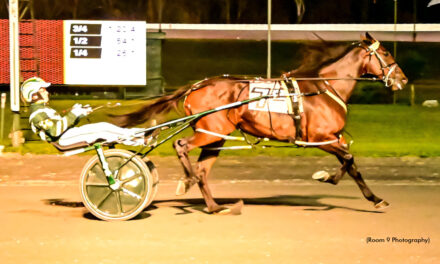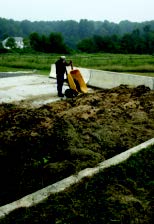For the latest on what’s happening in Annapolis – go to facebook.com/MarylandHorseCouncil
by Jane Seigler, MHC Government Relations Committee Co-Chair (written for the April 2024 Equiery)
Mid-March in Annapolis brings an annual ritual in which the legislators are in a mad dash, careening toward “Crossover Day” – this year, Crossover Day was March 18. After March 18, any bill that has not been passed by its chamber of origin and “crossed over” to the opposite chamber is very highly (although not necessarily) dead for this session. By the time you read this, Crossover Day will have come and gone, the marbled halls of the State House Complex will be figuratively littered with the tatters of bills that didn’t make it across, and the legislative machine will be full steam ahead toward getting the remaining bills passed before “sine die,” the last day of the session. Any bill not passed by both chambers by midnight on sine die (April 8 this year), will also fail for this session. Stay tuned for the the May issue for the final results!
The Government Relations Committee has been working hard to lobby on bills of particular import, and monitoring other bills of interest. Much of our work requires testifying at bill hearings during session, either in person in Annapolis, virtually, or in writing. But a big part of what we do involves the year-round work of establishing relationships of respect, credibility and trust with the legislators. Over many years, MHC has steadily worked to establish and grow those relationships. Several bills this session demonstrate the practical effect of those good relationships.
HB 640/SB 869 was intended to address a concern that buildings used for “value-added agriculture” (think winery and brewery tasting rooms, etc.) were being wrongly classified as “commercial” rather than “agricultural” for purposes of property tax assessments. This year’s bill included buildings used for equine activities on the list of “value added agricultural” buildings. That was something we got put in last year. But – it prescribed that while most buildings used in value added ag would be assessed at 25% of their full cash value, indoor riding arenas would be assessed at 50% of their full cash value. We immediately contacted the bill’s sponsors and asked for an explanation of this discriminatory treatment. Subsequently, the bills were withdrawn by the sponsors, so they are dead.
HB 1443 would allow possession and sale of consumer fireworks (currently prohibited). We were concerned that although the bill would prohibit use of fireworks within 300 feet of a “structure,” that distance is still quite close to a barn, and would not apply at all to a pasture or other animal enclosure. We contacted the sponsor, who agreed to amend the bill to add protections for livestock in the event that the bill passed. We also initiated a grass roots campaign alerting people to the bill and that it did not have protections for livestock. The bill received an unfavorable report in the committee and is dead.
HB 113/SB 42 would require minors to wear helmets when riding on public land or the grounds of a facility that solicits the public for recreational, educational or competitive activities, with certain exceptions. We have worked closely with the sponsors on this bill, helping to craft the legislative language and to find witnesses. As of press, the House bill has passed out of the House and moved over to the Senate. The bills are currently stalled in the Senate over possible amendments.
The exception to the “bills that fail to cross over are dead” rule is HB 1524, which would establish the framework to implement the recommendations of the Maryland Racetrack Operating Authority to consolidate racing at Pimlico, reconfigure and rebuild Pimlico, discontinue racing at Laurel Park, establish a training track at a TBD location, provide for the licensing of the rights to the Preakness from the Stronach Group (which would continue to own them), etc. This bill became active just before cross over and was scheduled for a hearing just a few days after cross over. At the hearing, legislators expressed commitment to preserving Thoroughbred racing in Maryland, although some legislators expressed concerns about funding sustainability in future years. Proponents of the bill stated that the plan was structured so that no state money would be needed to support racing operations in the future. Also at the hearing, representatives of the Standardbred racing segment expressed concerns about the provision that would take racetrack renewal funds from Rosecroft, to be used instead toward paying the debt service for the bonds issued for the Pimlico rebuild.
Another bill that surfaced late is HB 162/SB 452. This bill would declare provisions in routine liability disclaimers/waivers of negligence claims, as well as clauses relating to indemnification and hold harmless agreements, such as are found in lesson, boarding, and competition documents null and void as against public policy.
Other bills we are active on include:
HB 234/SB 278 would allow the MD Horse Industry Board to set late fees for stable license renewals. The House version has passed and crossed to the Senate. We support this bill.
HB 511/SB 826 would authorize a person operating a bicycle that is approaching a stop sign at an intersection on a highway with two or fewer lanes for moving traffic to “cautiously” make a turn or proceed through the intersection without stopping if the person reduces the speed of the bicycle to a “reasonable rate” and yields the right-of-way to vehicles in the intersection and vehicles near enough to the intersection “to pose an immediate danger.” We oppose the bill. Our testimony pointed out the vague terms in the bill, which make compliance and enforcement problematic and potentially dangerous, especially for people pulling horse trailers on rural roads. The House bill has passed and moved to the Senate.
HB 530/SB 645 would establish a Maryland Office of Trails in the Department of Transportation to develop and maintain a Maryland Trails Network, and advance the development, maintenance, and use of trails in the State. It would would also establish the Maryland Trails Advisory Commission in the Department of Transportation to provide guidance to State agencies regarding certain items related to trails. This ambitious bill attempts to establish a statewide, coordinated, network of trails for recreation and transportation. The bill placed a heavy emphasis on bicyclists and pedestrians, and contains no mention of equestrians, which we pointed out to the sponsor. At the hearing, the sponsor promised a complete re-working of the bill, due largely to budgetary constraints on funding and staffing the new office and commission. The bill was not amended and did not cross over, so it is dead for this year.
HB 667/SB 17 would establish that each animal harmed in a violation of a prohibition against animal cruelty is a separate offense; and other sentencing provisions. We support this bill. The Senate bill was amended to clarify application to domestic and farm animals and passed.
Two Sunday hunting bills: HB 778 which would allow statewide Sunday hunting of Migratory Game Birds, and SB 847 would repeal the 10:30 a.m. time restriction on Sunday hunting in Dorchester County for all game bird and game mammal seasons, failed to cross over.
HB 1358 would establish Gwynns Falls State Park as a partnership park between the Department and Baltimore City. We support this bill. It was amended to instead establish a focus group to study needs and costs for the park. It has passed and is now in Senate.
HB 1388 would add veterinarians to the list of professions for which “a noncompete or conflict of interest provision in an employment contract or a similar document or agreement that restricts the ability of an employee to enter into employment with a new employer or to become self–employed in the same or similar business or trade shall be null and void as being against the public policy of the State.” We support this bill. The bill was amended to strike the retroactivity clause and make it effective June 1, 2024. The bill passed and is in the Senate.
HB 1515 is meant to reduce the sales and use tax from 6% to 5%, but extending it to most services, including vets, farriers, equine dentists, legal and accounting services, etc. We oppose this bill. The bill failed to cross over and the tax on services does not appear to be included in the House budget package.
Other bills we are monitoring include:
HB 337/SB 315 which criminalizes failure to yield to bicycles or related vehicles in a bike lane or shoulder, with imprisonment of up to two months or a fine not to exceed $2,000 or both. Both versions passed and crossed over.
HB 434/SB 1143 exempts certain charitable organizations from the requirement to report use of paid lobbyists. House version passed to Senate
HB 447/SB 440 provides a tax credit for the donation of venison to certain organizations. Senate version passed to House
HB 991/SB 1074 and HB 1404/SB 1149 would authorize state (HB 991/SB 1074) or local (HB 1404/SB 1149) regulation and permitting of industrial sludge (DAF – dissolved air flotation by-products) facilities. Such facilities are often sited in rural areas, with little or no regulation. HB 1404 has been withdrawn; its Senate cross-file did not cross over. Both HB 991 and SB 1074 were heavily amended to put jurisdiction in the MD Department of Agriculture and have passed and crossed over.
SB 1035 would promote school-to-apprenticeship programs. This bill has passed to House.











